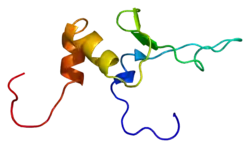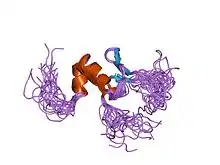ZBED1
Zinc finger BED domain-containing protein 1 is a protein that in humans is encoded by the ZBED1 gene.[3][4][5]
References
- GRCh38: Ensembl release 89: ENSG00000214717 - Ensembl, May 2017
- "Human PubMed Reference:". National Center for Biotechnology Information, U.S. National Library of Medicine.
- Nagase T, Ishikawa K, Suyama M, Kikuno R, Miyajima N, Tanaka A, Kotani H, Nomura N, Ohara O (Apr 1999). "Prediction of the coding sequences of unidentified human genes. XI. The complete sequences of 100 new cDNA clones from brain which code for large proteins in vitro". DNA Res. 5 (5): 277–86. doi:10.1093/dnares/5.5.277. PMID 9872452.
- Esposito T, Gianfrancesco F, Ciccodicola A, Montanini L, Mumm S, D'Urso M, Forabosco A (Mar 1999). "A novel pseudoautosomal human gene encodes a putative protein similar to Ac-like transposases". Hum Mol Genet. 8 (1): 61–7. doi:10.1093/hmg/8.1.61. PMID 9887332.
- "Entrez Gene: ZBED1 zinc finger, BED-type containing 1".
Further reading
- Bonaldo MF, Lennon G, Soares MB (1997). "Normalization and subtraction: two approaches to facilitate gene discovery". Genome Res. 6 (9): 791–806. doi:10.1101/gr.6.9.791. PMID 8889548.
- Strausberg RL, Feingold EA, Grouse LH, et al. (2003). "Generation and initial analysis of more than 15,000 full-length human and mouse cDNA sequences". Proc. Natl. Acad. Sci. U.S.A. 99 (26): 16899–903. doi:10.1073/pnas.242603899. PMC 139241. PMID 12477932.
- Ohshima N, Takahashi M, Hirose F (2003). "Identification of a human homologue of the DREF transcription factor with a potential role in regulation of the histone H1 gene". J. Biol. Chem. 278 (25): 22928–38. doi:10.1074/jbc.M303109200. PMID 12663651.
- Gerhard DS, Wagner L, Feingold EA, et al. (2004). "The Status, Quality, and Expansion of the NIH Full-Length cDNA Project: The Mammalian Gene Collection (MGC)". Genome Res. 14 (10B): 2121–7. doi:10.1101/gr.2596504. PMC 528928. PMID 15489334.
- Rual JF, Venkatesan K, Hao T, et al. (2005). "Towards a proteome-scale map of the human protein-protein interaction network". Nature. 437 (7062): 1173–8. doi:10.1038/nature04209. PMID 16189514.
- Lim J, Hao T, Shaw C, et al. (2006). "A protein-protein interaction network for human inherited ataxias and disorders of Purkinje cell degeneration". Cell. 125 (4): 801–14. doi:10.1016/j.cell.2006.03.032. PMID 16713569.
- Yamashita D, Komori H, Higuchi Y, et al. (2007). "Human DNA replication-related element binding factor (hDREF) self-association via hATC domain is necessary for its nuclear accumulation and DNA binding". J. Biol. Chem. 282 (10): 7563–75. doi:10.1074/jbc.M607180200. PMID 17209048.
- Yamashita D, Sano Y, Adachi Y, et al. (2007). "hDREF Regulates Cell Proliferation and Expression of Ribosomal Protein Genes". Mol. Cell. Biol. 27 (6): 2003–13. doi:10.1128/MCB.01462-06. PMC 1820502. PMID 17220279.
This article is issued from Wikipedia. The text is licensed under Creative Commons - Attribution - Sharealike. Additional terms may apply for the media files.



